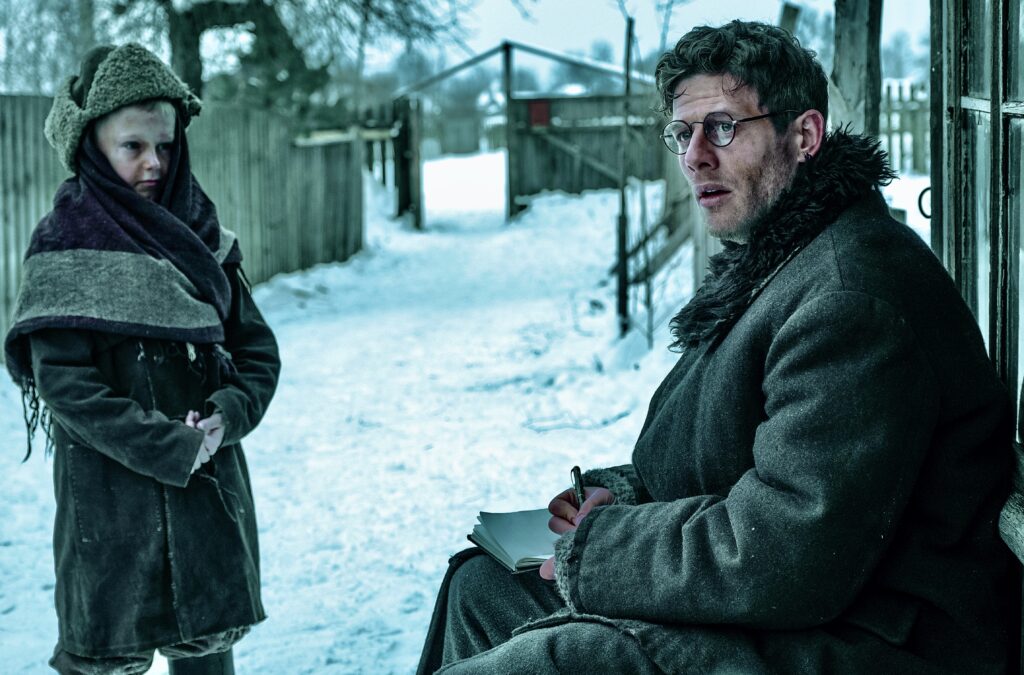
Before there was fake news, distorting realty for evil purposes was called propaganda. That’s what the Russians did pre-WWII to convince the West that the Soviet Ukraine had economic prowess, prosperous citizens and full bellies. BS. The truth had to be told.
In the 1930s, Gareth Jones (James Norton, Little Women and Belle), a young Welsh investigative journalist, is stationed in London and working for the former UK Prime Minister David Lloyd George (Kenneth Cranham). The reporter is renowned for his article about a plane trip he took with Adolph Hitler. Based on that notoriety, Jones assumes his bosses will support his idea of traveling east to dig into the real story regarding the Soviet Ukraine and hopefully debunk the USSR’s claim of prosperity for all. Jones: “Send me to Moscow to ask him (Stalin) where the money is coming from!”
Instead he’s rebuffed. With the aid of a fellow journalist, and not knowing the Russians are following his every move, the reporter makes it to Moscow. Helped by the malevolent New York Times writer Walter Duranty (Peter Sarsgaard, Shattered Glass) and the very lovely British journalist Ada Brooks (Vanessa Kirby, The Crown), Jones sets out on a voyage of discovery that quickly turns into a gruesome cold winter horror. First he witnesses the ravages of the Holodomor, Stalin’s deliberately-induced famine from 1932 to 1933, which ultimately killed millions of Ukrainians. Then he becomes part of the casualties.
Parallels to the Holocaust are obvious. Stalin’s comparison to Hitler is deserved. In a drama/thriller that is filled with history and should be a cautionary tale these days, screenwriter Andrea Chalupa and Golden Globe-winning writer/director Agnieszka Holland create a vivid memoir that’s based on facts and filled with tragedy and revelations. You don’t have to be a WWII buff to be totally engrossed in what’s on view.
The depravity and chaos of the USSR’s collectivization strategy, when millions of farmworkers were forced off their land and made to join state farms. The debauchery in the back rooms of Moscow—Jones at an orgy: “I’m standing opposite a naked Pulitzer Prize winner.” Human beings forced to do inconceivable things to survive a manmade famine. Abandoned children forced to eat tree bark. Corpses littering roads.
Holland has famously traveled in this era before in 1990 with her very accomplished and Oscar-nominated film Europa Europa. Back then, she chronicled the life of a Jewish boy in Nazi Germany who hid his identity and joined the Hitler Youth movement. With this venture she puts her protagonist in even more peril. Vicious soldiers chasing a writer who threatens to expose their government, deadly weather, deep snowy landscapes, bone-chilling temperatures all set in the Ukraine were farmhouses are abandoned and their precious grain is flowing out of the country.
With a special assist from cinematographer Tomasz Naumiuk (High Life, Nina), wintry scenes have never looked so bleak. Also, with a bit of tech magic lots of the footage has an antique look. The decadence of urban after-hour clubs is diametrically opposed to the abject poverty and despair in the countryside of Ukraine. The incongruity is twice as profound thanks to Grzegorz Piatkowski’s production design, Fiona Gavin’s art direction, Kinga Babczynska’s set decoration and Galina Otenko’s costumes. The Moscow party scenes look like something out of a Luchino Visconti (The Dammed) or Pier Paolo Pasolini (Salò) film.
As Jones travels from London to Russia’s capital city to the hinterlands, the danger in his journey and the duplicitousness of the people he meets indicate that his safety is not guaranteed and his death could come any minute—from Russian operatives or the elements. The tension, thriller elements and suspense are rock steady often in the most artistic ways. Holland is an auteur. There are very few filmmakers left today that are of her caliber. The composition in each shot, the performances she gets, the style she renders are just stunningly beautiful and haunting.
James Norton tackles this very nerdy but persistent reporter with a verve and naiveté that will make viewers eager to learn about his exploits. Jones is always astonished that others don’t want to know the truth. He’s equally peeved by those who attempt to stymy his commentary. Norton works those angles well. Vanessa Kirby plays Ada Brooks in a cunning way that makes you question her loyalty. While Peter Sarsgaard is clear about Walter Duranty’s persona, this character is equal parts orgy beast and consummate liar. The kind of snake audiences love to hate.
Prep yourself for the film’s 2h 21min length. Be assured that none of that time is a waste thanks to Michal Czarnecki’s editing. Be patient. Antoni Lazarkiewicz’s dramatic and entrancing musical score gives the film the gravitas of an award-winning production and should take your mind off the running time.
There are some bookend plot points around Jones’ story that involve author George Orwell (played by Joseph Mawle), who was evidently influenced by Jones’ articles when he wrote his classic dystopian novel Animal Farm. Questionably the film gives this interesting detail a bit more of a spotlight than it deserves. The Orwell connection is a unique fact. Worth a mention, but not a chapter. The reporter’s ordeal is the centerpiece.
There are moments in the blistering cold when Jones’s quest for truth looks like it will end. This is where Holland and the script turn the drama up so high that you’re rivetted to his plight, lost in his agony, shivering in the frosty climate and pained his story may never be told or no one will care.
Seeking his reputation back, setting an alarm, alerting the world and trying to make sure that what he’s seen will never be forgotten forcefully drives the narrative to its conclusion.
Visit NNPA News Wire Film Critic Dwight Brown at DwightBrownInk.com and BlackPressUSA.com.